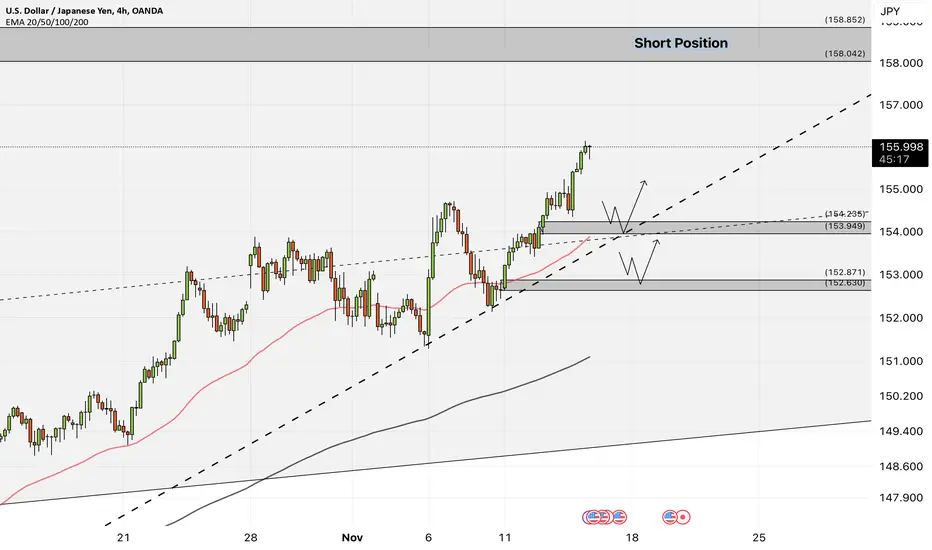The USDJPY currency pair is above the EMA200 and EMA50 in the 4H timeframe and is moving in its medium-term bullish channel. In case of correction due to the release of today's economic data, we can see the demand zones and buy within those two zones with the appropriate risk reward.
John Thune, the senator from South Dakota, has been elected as the Republican Senate Majority Leader. This election received broad support from Trump-aligned Republicans, though some factions within the GOP, particularly the far-right, were less welcoming of the choice. In this race, Thune faced competition from John Cornyn of Texas and Rick Scott of Florida, although Scott was not seen as a significant threat. Thune ultimately won in a direct, closed-ballot vote against Cornyn, securing the Senate leadership position.
Moody’s has announced that financial risks concerning the United States’ fiscal strength have escalated. In a statement, Moody’s highlighted the outlook on U.S. national debt, identifying the “decisive victory of Republicans” as a specific risk factor. Moody’s stated, “In the absence of policy measures to curb the budget deficit, federal fiscal strength will deteriorate, increasingly impacting the U.S. sovereign credit profile.”
Given the fiscal policies promised by Trump during his election campaign—and the high likelihood of their passage due to the shift in Congress—U.S. fiscal strength-related risks have increased. While Trump’s victory has been seen as positive for certain risk assets, it has had negative implications for bonds.
Meanwhile, a Bank of Japan official indicated that Japan is not currently in need of extensive financial support, allowing the central bank to resume interest rate hikes after a brief pause to assess U.S. economic developments.
Another Bank of Japan member warned that raising rates could cause market shocks, disrupting the normalization path of Japan’s monetary policies, as the divergence in policy directions between the U.S. and Japan could heighten foreign exchange market volatility. Additionally, one member emphasized the need to be prepared for potential market fluctuations due to the U.S. presidential election results.
John Thune, the senator from South Dakota, has been elected as the Republican Senate Majority Leader. This election received broad support from Trump-aligned Republicans, though some factions within the GOP, particularly the far-right, were less welcoming of the choice. In this race, Thune faced competition from John Cornyn of Texas and Rick Scott of Florida, although Scott was not seen as a significant threat. Thune ultimately won in a direct, closed-ballot vote against Cornyn, securing the Senate leadership position.
Moody’s has announced that financial risks concerning the United States’ fiscal strength have escalated. In a statement, Moody’s highlighted the outlook on U.S. national debt, identifying the “decisive victory of Republicans” as a specific risk factor. Moody’s stated, “In the absence of policy measures to curb the budget deficit, federal fiscal strength will deteriorate, increasingly impacting the U.S. sovereign credit profile.”
Given the fiscal policies promised by Trump during his election campaign—and the high likelihood of their passage due to the shift in Congress—U.S. fiscal strength-related risks have increased. While Trump’s victory has been seen as positive for certain risk assets, it has had negative implications for bonds.
Meanwhile, a Bank of Japan official indicated that Japan is not currently in need of extensive financial support, allowing the central bank to resume interest rate hikes after a brief pause to assess U.S. economic developments.
Another Bank of Japan member warned that raising rates could cause market shocks, disrupting the normalization path of Japan’s monetary policies, as the divergence in policy directions between the U.S. and Japan could heighten foreign exchange market volatility. Additionally, one member emphasized the need to be prepared for potential market fluctuations due to the U.S. presidential election results.
Disclaimer
The information and publications are not meant to be, and do not constitute, financial, investment, trading, or other types of advice or recommendations supplied or endorsed by TradingView. Read more in the Terms of Use.
Disclaimer
The information and publications are not meant to be, and do not constitute, financial, investment, trading, or other types of advice or recommendations supplied or endorsed by TradingView. Read more in the Terms of Use.
